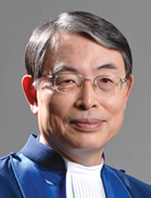This website uses cookies
We use cookies to ensure that we give you the best experience on our website. If you continue to use this site we will assume that you are happy with it.
When Sang-Hyun Song, J.S.D. ‘70 was nine years old, war broke out in his home country, Korea. “For three months,” he recalled, “my family was hiding in a hot and humid underground bunker. It was my task to find food. I passed hundreds of dead bodies lying on the streets. I can remember the horrible stench.”

Sang-Hyun Song, President of the International Criminal Court
Those experiences led Song to a law degree and further legal studies in the United States and the United Kingdom. At the prestigious Seoul National University, he became professor of law, then dean of the law school. He served on an advisory committee to the Korean Supreme Court and the Ministry of Justice, working on the reform of the national litigation and criminal justice systems.
When the United Nations created the International Criminal Court (ICC) in 2002, Song was elected as one of the judges. In 2009, he became president of the ICC. Song noted that the creation of the ICC “was the most significant development in international law since the adoption of the UN Charter.”
Song’s international interests developed in 1968 when, he said, “it was extremely rare for any Korean college graduate to leave the country for studies abroad. However, he added, “my professor in Korea emphasized the need to study further in Anglo-American common law systems.” Korea was opening its markets for foreign investors, many of whom negotiated under U.S. common law instead of Korean civil law.
With a Fulbright grant, Song attended Tulane University where he earned his LL.M. Because Louisiana combines common law with the civil law of the Napoleonic code, Song explained, “Tulane is academically a unique and assimilating law school.” He next enrolled at Cambridge University, earning a diploma in comparative legal studies.
Then, Song said, “I had to find a leading national law school where I could wind up my advanced legal studies with the aim of obtaining a doctoral degree. An American friend of mine, a professor of law in Florida, recommended Cornell very strongly.” He contacted two Korean faculty members at Cornell—not in law, but in botany and engineering. “Their advice reinforced my American friend’s recommendation, so I didn’t hesitate,” Song recalled.
He remembers Cornell and the Finger Lakes region very fondly. “Cornell can be proud of having the most beautiful campus in the whole U.S. if not in the whole world,” said Song. He went fruit picking at the Cornell apple orchard. He found time to play basketball, ping-pong, tennis—and golf. “Cornell has a really fantastic golf course,” he said. “When I found out the course designer was Robert Trent Jones, I was even more thrilled.”
In that same year, Jack Barceló, the William Nelson Cromwell Professor of International and Comparative Law, arrived at Cornell Law School as a newly minted assistant professor and met Song, a new candidate for a doctorate in law. “He did his degree in record time,” Barceló recalled. “He was very diligent and extremely talented.” William Tucker Dean and David Curtis were members of Song’s committee, and Barceló recalled sitting in on a meeting. “You could see that Song was destined for great things,” he said. Barceló has invited Song back to lecture several times, including a recent alumni event at Cornell’s Summer Institute of International and Comparative Law in Paris.
The ICC was established by the 2002 Rome Statute, now signed by 120 countries, with the purpose of ending impunity for war crimes and contributing to their prevention. It is an independent international organization. While the United States was a prime negotiator in the Rome Statute, and is willing to support the court’s efforts, they do not plan to join.
Professor Jens Ohlin, who specializes in international law, noted that “at first, people were unsure about what the ICC would look like and whether it would be successful. All those doubts have been erased.”
Song always stresses the complementarity of the ICC. “It is the responsibility of the national legal systems to prosecute Rome Statute crimes. Only if they can’t or do not want to do so, only then does the ICC step in,” he said. A state can ask for help from the ICC, and the UN Security Council can request that the ICC look into an issue. In fact, Song characterizes the newly emerging criminal justice system as “a big puzzle,” composed not only of the ICC states, but also all intergovernmental organizations, such as the EU and the UN, as well as NGOs.
So far, twenty-eight persons have been subject to ICC proceedings or arrest warrants. On March 14, the court issued its first judgment, in the case against Thomas Lubanga Dyilo, for use of child soldiers in the Democratic Republic of the Congo. “Most of the African investigations have been started because a state has referred the case,” Ohlin explained, adding that a recent YouTube video about another child soldier case involving Joseph Kony “has become viral. You see that the ICC can put certain issues on the forefront worldwide.”
“Crimes against international law are created by men, not abstract entities,” Song explains. “Punishing such individuals is an important step toward peace, justice, and the rule of law.”